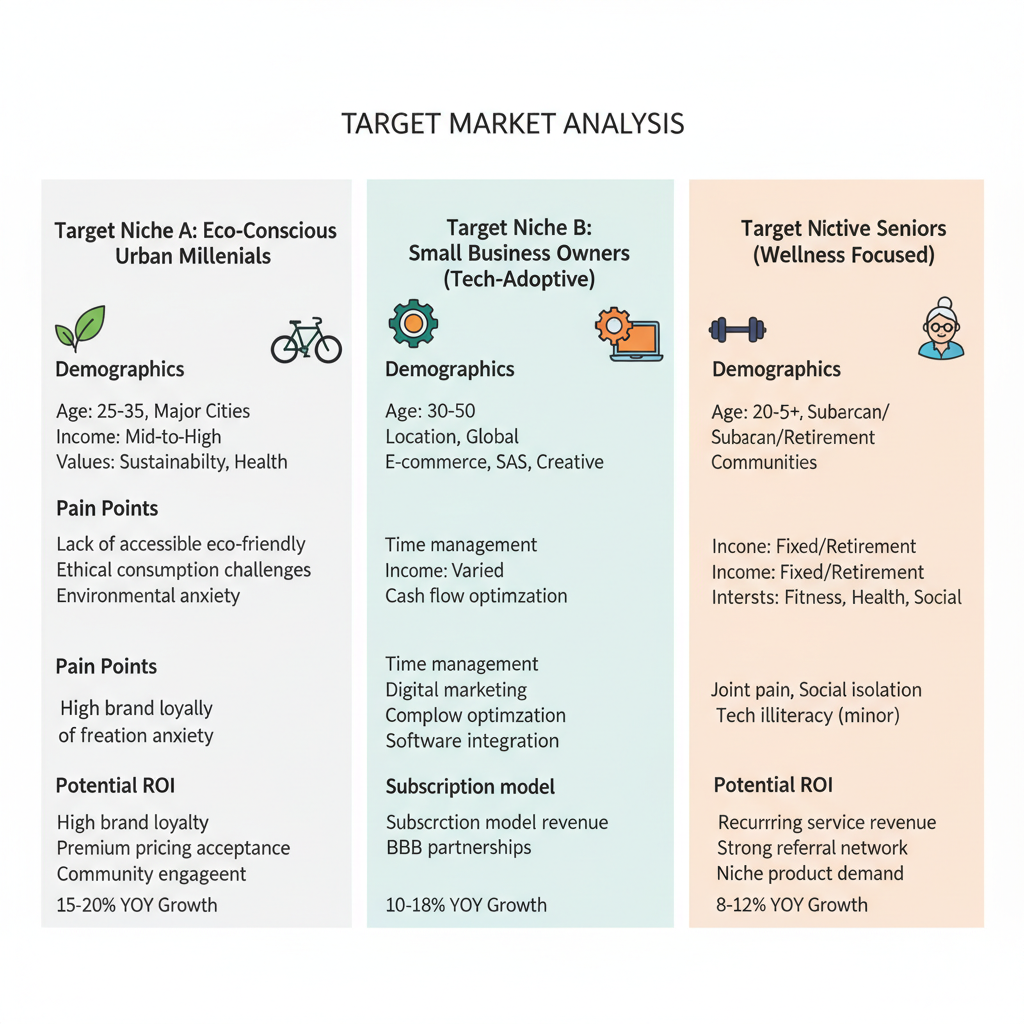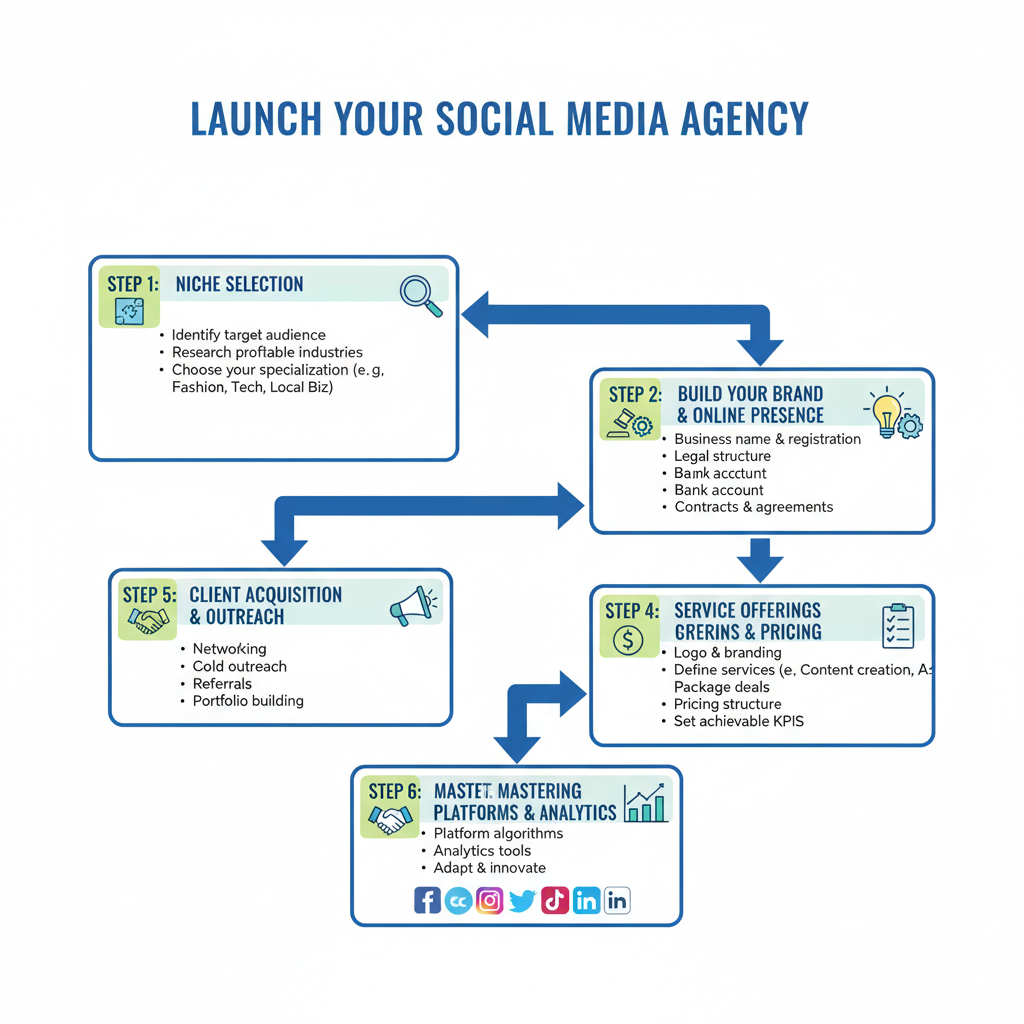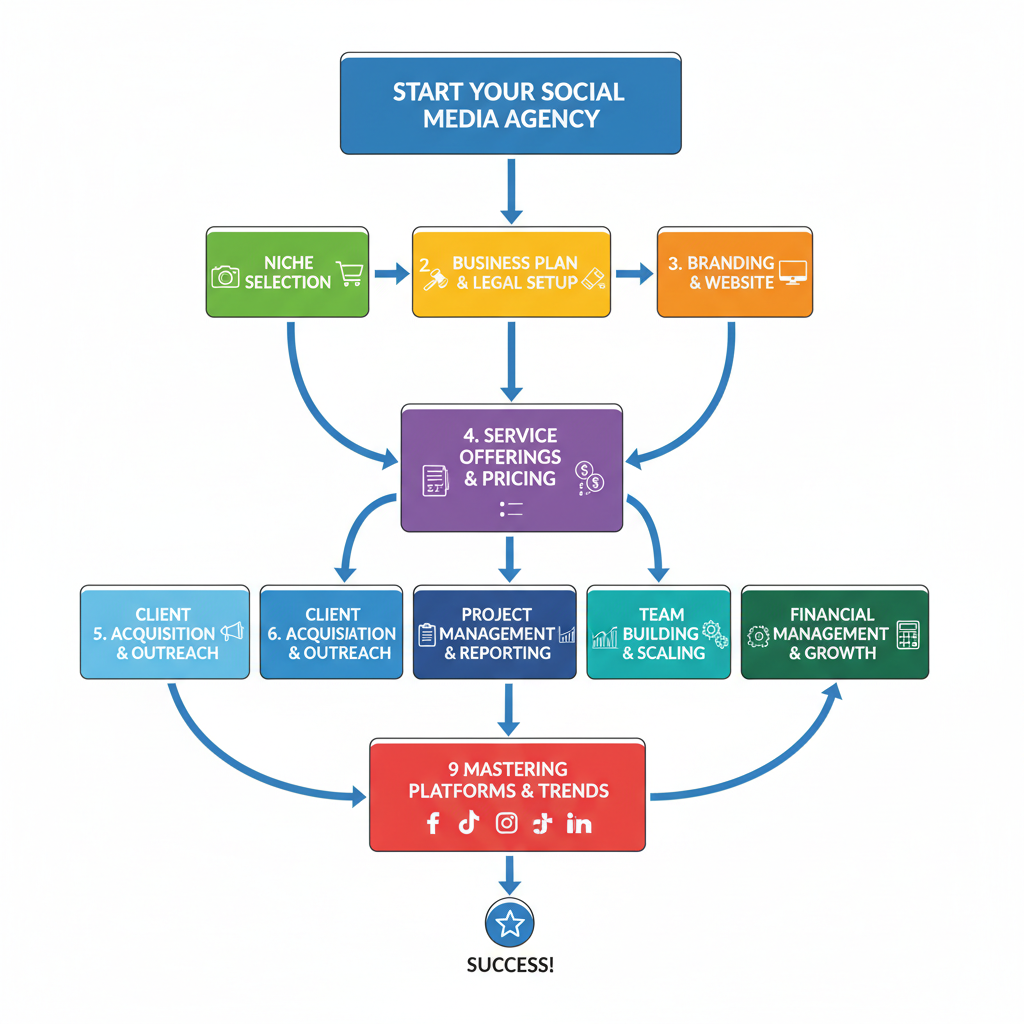Starting a Social Media Agency Step-by-Step Guide
Learn how to start a successful social media agency with steps from defining your niche to building an SEO-friendly website and marketing strategy.

Starting a Social Media Agency: Step-by-Step Guide
Launching a social media agency is one of the most exciting and profitable ventures in the modern digital marketing industry. As businesses increasingly depend on skilled professionals to manage their online presence, starting a social media agency offers an opportunity to help brands grow while building a scalable, creative enterprise. In this comprehensive guide, you’ll find tried-and-tested steps to go from idea to thriving operation, with strategies that maximize visibility, client satisfaction, and sustainable growth.

---
Define Your Niche and Target Market
Identifying your niche is essential for differentiating your agency in a competitive market. Specializing allows you to tailor your services and become known as an expert in that segment.
- Industry focus: Examples include hospitality, e-commerce, health and fitness, or tech startups.
- Platform specialization: Consider becoming a TikTok engagement expert or a LinkedIn B2B strategist.
The more specific your target audience, the more relevant your campaigns and case studies will be, leading to stronger client relationships.
---
Conduct Competitor Research and Identify Your USP
Competitor analysis helps you spot market gaps and opportunities. Search regionally and globally to study agencies in your niche. Analyze:
- Service line-ups
- Pricing models
- Testimonials
- Overall branding tone
Your Unique Selling Proposition (USP) could be faster turnaround, deeper analytics reporting, imaginative campaigns, or insider knowledge in a niche industry.
---
Create a Robust Business Plan
A well-structured business plan guides your growth while helping secure funding if necessary. It should include:
- Detailed service offerings (e.g., content creation, paid search/social ads, analytics)
- Flexible pricing models (project-based, retainer, or commission on ad spend)
- Scalability milestones over 6 months, 12 months, and beyond
| Service | Pricing Model | Scalability Potential |
|---|---|---|
| Social Media Management | Monthly Retainer | High |
| Paid Ad Campaigns | Percentage of Ad Spend | Medium |
| Content Strategy Consulting | Hourly Rate | High |
---
Set Up Legal Structure and Client Onboarding
Register your business according to local laws. The most common structures are:
- Sole Proprietorship
- LLC
- Corporation
Create clear contracts outlining deliverables, timelines, and payment schedules. Develop an onboarding checklist to standardize how clients are introduced to your processes for a smooth, professional experience.
---
Build an SEO-Optimized Website
Your website acts as a digital storefront and credibility builder. Include:
- Dedicated service pages
- Portfolio or detailed case studies
- Testimonials and recognizable client logos
- Quick contact or booking forms

Ensure your site is mobile-friendly and strategically optimized for keywords such as starting a social media agency, social media management, and digital marketing services to improve search visibility.
---
Develop a Content Marketing Strategy
Effective content marketing attracts potential clients and positions you as an authority. Options include:
- Weekly blog posts on emerging social media trends
- Short video tips on campaign optimization
- LinkedIn articles with client case highlights
Maintain a consistent publishing calendar to ensure steady growth in organic traffic and brand recognition.
---
Master Core Social Media Platforms
Understanding the strengths and user base of each major platform is non-negotiable:
- Facebook: Ideal for community building and targeted ads.
- Instagram: Best for lifestyle branding, Stories, and Reels.
- TikTok: Perfect for viral, short-form video content.
- LinkedIn: For B2B networking and thought leadership.
- Pinterest: Suited for lifestyle inspiration and product discovery.
Adapt your strategies and content to suit each platform’s unique algorithms and audience behaviors.
---
Learn and Integrate Essential Tools
The right tools will save time and improve results. Prioritize:
- Scheduling Tools: Buffer, Hootsuite
- Analytics Platforms: Google Analytics, native insights
- Ad Managers: Facebook Ads Manager, LinkedIn Campaign Manager
Use data from these tools to continually refine campaigns and boost client ROI.
---
Create a Strong Portfolio
If you don’t yet have paying clients, prepare mock projects or collaborate for free with nonprofits. Focus on:
- Creative content samples
- Brand consistency demonstrations
- Engagement and reach reports
A rich portfolio increases credibility during prospect meetings or proposals.
---
Implement Lead Generation Strategies

Build a pipeline through:
- Networking at targeted conferences and events
- Cold outreach via email or social media DMs
- Hosting free webinars on social media growth tactics
- Collaborating with web designers, branding experts, or PR firms
Regularly evaluate which channels produce the most qualified leads, and invest more effort in those.
---
Deliver and Showcase Exceptional Results
Reputation hinges on measurable success. Provide monthly reports covering:
- Follower growth
- Engagement metrics
- Conversion numbers from campaigns
- Data-driven recommendations for next steps
This transparency builds client trust and encourages long-term partnerships.
---
Retain Clients and Upsell Services
Retention is more efficient than constant client acquisition. Tactics include:
- Loyalty or bundle discounts
- Expanding your service menu (email marketing, influencer outreach)
- Quarterly strategic performance reviews
Upselling could involve premium analytics services, adding new social platforms, or professional video production.
---
Scale with Team Building
As projects multiply, delegate tasks either by hiring in-house talent or outsourcing to vetted freelancers. Document workflows to accelerate training and ensure consistent quality regardless of team size.
---
Keep Skills and Knowledge Current
The social media landscape shifts rapidly, so ongoing learning is essential:
- Attend industry conferences
- Take specialized online courses
- Experiment with emerging platforms
- Follow thought leaders and industry publications
Agility and innovation are crucial to keeping your agency competitive and relevant.
---
Summary & Next Steps
Starting a social media agency blends creativity, business strategy, and technical expertise. By narrowing your niche, delivering measurable results, and investing in continuous learning, you can position your agency as a top-tier provider in a thriving industry. Now is the perfect time to put this guide into action—start laying the groundwork today and turn your passion for social media into a profitable business.
Ready to take the next step? Begin crafting your business plan and setting up your online presence to attract your first clients.



